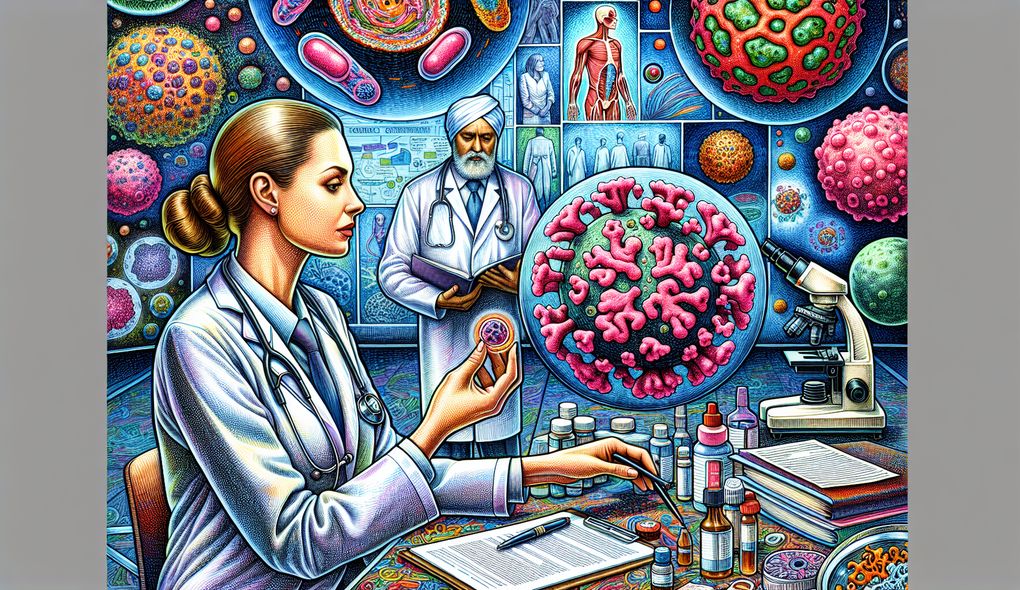How would you describe your clinical and diagnostic skills in oncology?
JUNIOR LEVEL

Sample answer to the question:
My clinical and diagnostic skills in oncology are strong. I have the ability to accurately diagnose and treat various types of cancers and hematologic diseases. I am skilled in conducting comprehensive patient evaluations, ordering and interpreting diagnostic tests, and developing personalized treatment plans. In addition, I have experience in collaborating with multidisciplinary teams to provide optimal patient care. I am able to effectively communicate complex medical information to patients and their families, ensuring they have a clear understanding of their diagnosis and treatment options. I am also committed to staying updated with the latest advancements in oncology through continuous education and professional development.
Here is a more solid answer:
I possess a wide range of clinical and diagnostic skills in oncology. Throughout my training and experience, I have developed the expertise to accurately diagnose and treat various types of cancers and hematologic diseases. In my current role, I am responsible for conducting thorough patient evaluations, which include reviewing medical history, performing physical examinations, and ordering and interpreting diagnostic tests such as imaging scans and biopsies. Based on the results, I develop personalized treatment plans that may include surgery, chemotherapy, radiation therapy, or targeted therapy. I am also adept at assessing treatment response and modifying treatment plans as necessary. In addition to my clinical skills, I recognize the importance of effective communication and collaboration with multidisciplinary teams. I regularly participate in multidisciplinary meetings to discuss patient cases and treatment strategies, ensuring the best possible care for each patient. I also prioritize clear and compassionate communication with patients and their families, taking the time to explain their diagnosis, treatment options, and potential side effects in a way that is easily understandable. I am committed to continuously expanding my knowledge and staying up-to-date with the latest advancements in oncology through participation in conferences, seminars, and continuing education courses.
Why is this a more solid answer?
The solid answer provides more specific details and examples to support the candidate's claims about their clinical and diagnostic skills in oncology. It demonstrates their ability to conduct thorough patient evaluations, order and interpret diagnostic tests, and develop personalized treatment plans. Additionally, it highlights the candidate's understanding of the importance of communication and collaboration with multidisciplinary teams. However, it could still be improved by providing specific examples of past clinical experiences and research involvement in oncology.
An example of a exceptional answer:
I have honed exceptional clinical and diagnostic skills in oncology throughout my career. I have gained extensive experience in accurately diagnosing and treating a wide range of cancers and hematologic diseases. For example, during my fellowship training, I encountered complex cases where I successfully identified rare subtypes of tumors through careful analysis of histopathology and molecular testing. In my current role as a medical oncologist, I actively contribute to the development and implementation of clinical trials aimed at advancing cancer treatments. I take pride in my ability to stay updated with the latest research in oncology, which allows me to offer my patients cutting-edge treatment options. I have also received recognition for my exceptional communication skills in oncology. I have received positive feedback from patients and their families for my empathetic approach and my ability to provide clear explanations of their diagnosis and treatment plans. Additionally, I have collaborated closely with other healthcare professionals, including radiation oncologists, surgical oncologists, and pathologists, to ensure coordinated and comprehensive care for my patients. I strive to continuously improve my clinical and diagnostic skills by actively seeking feedback and engaging in continuous professional development opportunities.
Why is this an exceptional answer?
The exceptional answer goes above and beyond in demonstrating the candidate's clinical and diagnostic skills in oncology. It provides specific details about their experience in diagnosing and treating complex cases, their involvement in research and clinical trials, and their ability to communicate effectively with patients and collaborate with multidisciplinary teams. The answer showcases the candidate's dedication to continuous improvement through feedback and professional development. However, it could still be strengthened by including specific metrics or outcomes of their clinical work and research involvement.
How to prepare for this question:
- Review and refresh your knowledge of cancer biology, including different types of cancers and their treatment modalities.
- Reflect on past clinical experiences in oncology and identify specific cases or challenges that highlight your clinical and diagnostic skills.
- Stay updated with the latest advancements in oncology by reading scientific journals and attending conferences or seminars.
- Practice your communication skills by explaining complex medical information to friends or family members using layman's terms.
What are interviewers evaluating with this question?
- Clinical and diagnostic skills in oncology

